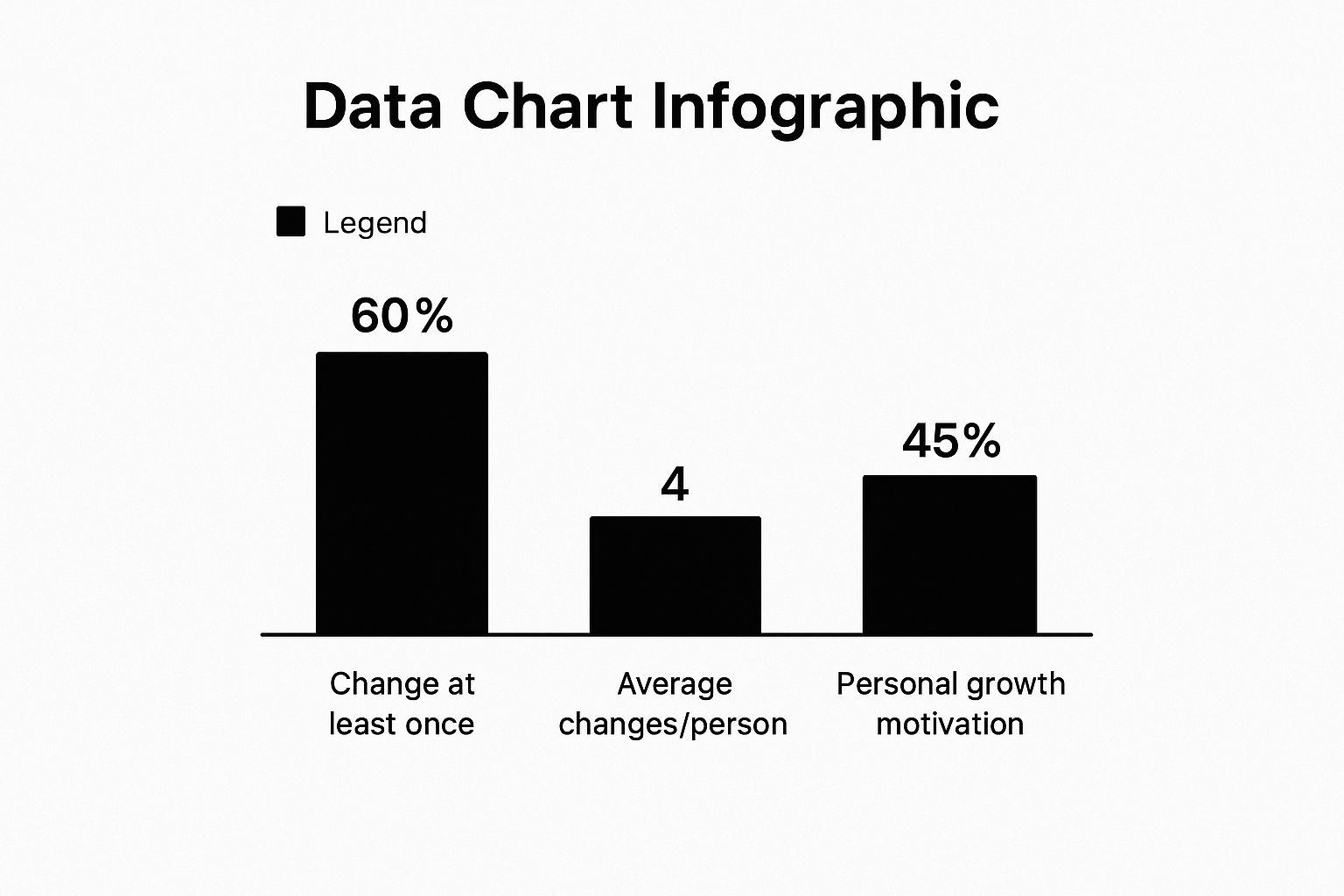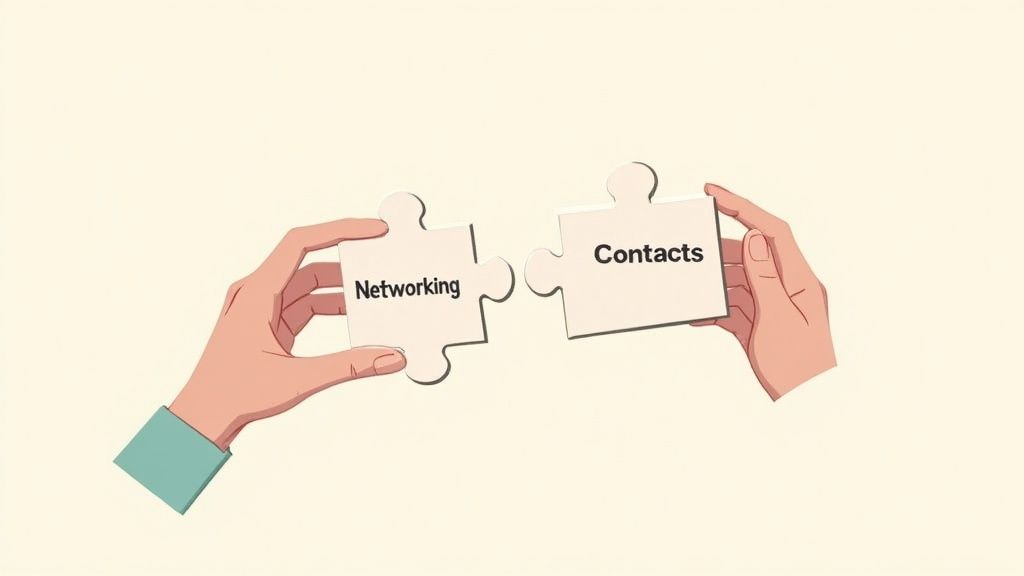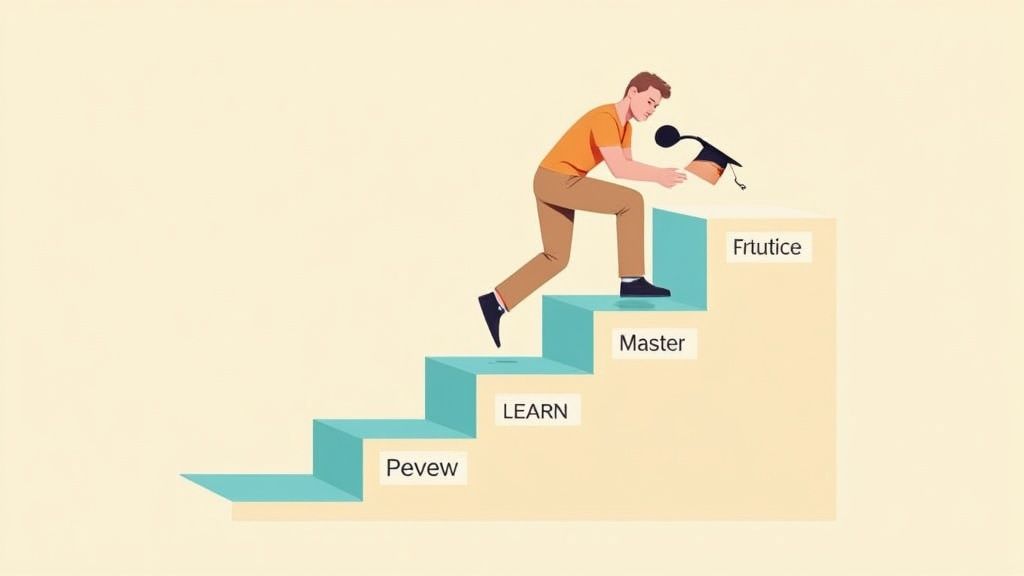
Career Change Advice That Actually Works
Published
That Sunday night feeling of dread is a powerful signal. If you find yourself constantly daydreaming about a different job or your motivation has simply vanished, your own intuition is probably giving you some solid career change advice. It's often the very first whisper that it's time to explore something new.
Is It Actually Time for a Career Change?
If you’re reading this, you’re in good company. Questioning your professional path is more common than you might think. A role that once felt secure and fulfilling can slowly start to feel like a dead end, leaving you wondering if a major shift is on the horizon.
The real challenge is telling the difference between a rough patch and a fundamentally wrong fit. A stressful project is temporary, but persistent burnout that spills into your weekends? That's a much clearer warning. Likewise, feeling underappreciated for a short time is one thing; realizing your core values no longer sync up with your company's mission is another entirely.
Recognizing the Key Signals
The signs that you need a change often creep in slowly before they become too loud to ignore. Have you noticed any of these?
- Persistent Burnout: This isn't just about feeling tired. It's that deep emotional, physical, and mental exhaustion from prolonged stress. You might feel cynical about your work and doubt your own abilities.
- A Values Mismatch: You find yourself regularly disagreeing with company decisions or feeling like your work doesn't contribute to something you actually believe in. This gap between your principles and your daily grind is incredibly draining.
- Stagnant Growth: When was the last time you learned a genuinely new skill, took on a project that truly challenged you, or saw a clear path for advancement? If you have to think too hard, your professional growth has likely stalled.
Before you make any big moves, it's helpful to take stock of where you're at. This table can help you translate those gut feelings into concrete observations.
Signs You're Ready for a Career Change
| Warning Sign | What It Looks Like in Real Life | A Productive Next Step |
|---|---|---|
| Boredom & Disengagement | You're "phoning it in," doing the bare minimum to get by, and watching the clock all day. | Start exploring hobbies or side projects that genuinely excite you to rediscover your passions. |
| Constant Stress & Dread | The "Sunday Scaries" have become a weekly ritual, and you feel anxious just thinking about work. | Pinpoint the specific stressors. Is it the workload, the culture, or the tasks themselves? |
| No Room to Grow | You've hit a ceiling with no promotions, raises, or learning opportunities in sight. | Research roles or industries where your skills are in high demand and growth is expected. |
| Feeling Undervalued | Your contributions are consistently overlooked, and you feel like just another cog in the machine. | Update your resume with your key accomplishments to remind yourself of your value. |
Seeing your feelings laid out like this can be a powerful confirmation that what you're experiencing isn't just a slump—it's a signal that you're ready for something more.
A modern career isn't a straight line. Thinking about a change isn't a sign of failure; it's an act of taking control of your professional well-being and future success.
This infographic really puts into perspective how common—and smart—these moves have become.

As the data shows, most professionals will change careers multiple times, usually driven by a desire for personal growth. This is the new normal.
The Evolving Job Market
The world of work itself is in constant motion. While automation is expected to displace 92 million jobs by 2030, it’s also predicted to create 170 million new ones. That's a net gain of 78 million roles globally.
This new reality means adaptability is your greatest asset. In fact, 44% of the workforce will need to reskill within the next five years to stay relevant. You can review a complete analysis of these job market shifts to get a better handle on the trends.
A career change is no longer the risky gamble it once was; it's a strategic move. The old idea of staying in one job for life is a relic of the past. Today, building a career you love often means pivoting to chase new opportunities and align with your own ambitions. Recognizing you need a change is the first, most powerful step toward making it happen.
Starting Your Journey with Self-Discovery

Before you even think about touching your resume or scrolling through job boards, the real work begins. It’s internal. The best career changes I've ever seen—the ones that stick—start with a hard look at who you are now, not who you were when you first started down your current path. This is about creating a personal blueprint for what a genuinely fulfilling career looks like for you.
We're often told to "follow your passion," but let's be honest, that advice can feel a bit hollow. Passion can be fickle. A much more grounded approach is to get real about your energy, your values, and the skills you already possess. This isn't about finding some mythical "dream job." It's about identifying the core ingredients that will make your next chapter both sustainable and exciting.
Conduct a Personal Energy Audit
Think of your daily energy like a bank account. Some tasks make deposits, while others make withdrawals. The first step is figuring out which is which. For one week, just keep a simple log of what you do at work each day.
At the end of the day, look at your list. Mark each task with a plus (+) if it left you feeling engaged and fired up, or a minus (-) if it left you feeling drained or bored.
For example, a marketing manager might find that brainstorming creative campaign concepts gives them a jolt of energy (+), but pulling together those dense monthly performance reports (-) feels like a total slog. The goal here isn't to judge the tasks; it's simply to gather data on what actually fuels you. This simple audit can give you incredibly powerful clues about the kind of work you should be running toward.
Identify Your Core Values and Non-Negotiables
Your values are your internal compass. When your job aligns with them, you feel a sense of purpose. When it doesn't, you feel that constant, nagging friction that probably has you reading this article in the first place.
Take a moment to think about what truly matters to you in a professional environment. Jot down a list and then try to whittle it down to your top five.
- Autonomy: Do you need the space to manage your own projects and call the shots?
- Collaboration: Do you come alive when you're bouncing ideas off a smart, creative team?
- Impact: Is it critical for you to see that your work makes a tangible, positive difference?
- Stability: Is a predictable schedule and a steady paycheck a must-have for your peace of mind?
- Learning: Do you get restless if you're not constantly picking up new skills and knowledge?
Once you've got your core values, it's time to define your "non-negotiables." These are the absolute deal-breakers for your next job. Maybe you've sworn off any commute longer than 30 minutes, or perhaps having the flexibility to work from home at least two days a week is an absolute must.
Understanding your non-negotiables is liberating. It gives you the power to say "no" to opportunities that look good on paper but would ultimately make you miserable. It’s how you avoid making the same mistakes again.
Uncover Your Hidden Transferable Skills
This is a big one. So many career changers fall into the trap of thinking they're starting from scratch. The truth is, you're sitting on a goldmine of transferable skills that are incredibly valuable in other fields. You just need to learn how to frame them in a new context.
Forget your job title for a second and focus on what you actually do and the results you've delivered. A high school teacher, for instance, does so much more than just "teach." They have a ton of experience in:
- Public Speaking and Presentation: They deliver complex information to a diverse audience every single day.
- Project Management: They plan and execute an entire semester's curriculum for multiple groups simultaneously.
- Stakeholder Communication: They are masters at managing expectations with parents, administrators, and students.
- Content Creation: They develop engaging lesson plans, worksheets, and other educational materials from the ground up.
These are the exact skills needed to excel in corporate training, content marketing, or even a social media marketing career path. The ability to reframe your experience is what separates a successful career transition from a frustrating one. By taking the time for this self-discovery, you'll move from a vague sense of "I need a change" to having a clear, actionable profile of your ideal next move.
Finding Your Fit: How to Explore and Validate a New Career Path
Okay, so you’ve done some soul-searching and have a few promising career ideas. That’s your map. Now it’s time to actually scout the territory and see if the destination is as great as it sounds on paper.
This is the research phase, where you swap assumptions for real-world intel. Making a blind leap is a recipe for disaster. Instead, think of this stage as a series of low-stakes experiments to test your ideas. Honestly, this is the most solid career change advice you'll ever get.
Ditch the "Informational Interview," Have a Real Conversation
Let's drop the stuffy corporate jargon. Nobody wants to have an "informational interview." What you really want is a career conversation—a genuine chat with someone who’s living and breathing the job you’re curious about.
You’d be surprised how many people are happy to share their story. The key is to approach them with genuine curiosity and a deep respect for their time. A generic, copy-paste message is easy to ignore, but a thoughtful one almost always gets a look.
Here’s a simple template I’ve seen work time and time again for LinkedIn or email:
Subject: Question about your experience in [Their Field]
Hi [Name],
I came across your profile and was really impressed with your work at [Their Company]. I'm currently a [Your Current Role] and I'm exploring a career shift into [Their Field].
I know how busy you are, but if you had just 15 minutes to spare in the next few weeks, I'd be so grateful to hear about your experience. I'm trying to make an informed decision and your perspective would be invaluable.
Thanks for your time,
[Your Name]
See how that works? It's short, respectful, and makes a clear, low-commitment request. You're not a job-seeker; you're a proactive professional doing your homework.
Time to "Test Drive" Your New Career
Talking to people gives you the theory, but hands-on experience is where you find the truth. The absolute best way to know if you’ll enjoy a new career is to actually do the work, even on a small scale.
Here are a few low-risk ways to get a real feel for a new role:
- Take on a small freelance project. Platforms like Upwork or Fiverr are perfect for this. If you’re thinking about content writing, try taking a gig to write a few blog posts for a small business. You’ll find out quickly if you enjoy the process.
- Sign up for a weekend workshop. A two-day boot camp on SEO or social media analytics can give you a concentrated dose of the work without requiring a huge life change.
- Volunteer with a purpose. Find a non-profit that needs help in your target field. Want to get into event marketing? Offer to help a local charity organize its annual gala. It's real-world experience that also looks fantastic on a resume.
This approach helps you gut-check if the day-to-day reality of the job aligns with what you think it will be. If you're interested in broadening your options, exploring a comprehensive digital marketing career path can show you how different specializations connect.
A Real-World Example: From Retail to HR
Let's look at Sarah, a retail manager who’s burned out from the chaotic hours. She’s intrigued by human resources, specifically employee training.
Here’s how she could smartly validate this new direction:
- Start Talking: Sarah connects with three HR pros on LinkedIn. From these career conversations, she learns that her project management and communication skills from retail are highly transferable.
- Find the Gap: The conversations also reveal a gap—she has no formal knowledge of adult learning principles, a key part of corporate training.
- The Low-Risk Test: Instead of jumping into a pricey, year-long degree, she finds a $300 online certification in corporate training. It only takes six weeks to complete in the evenings.
- Apply It Now: While taking the course, she gets her manager's approval to create a new onboarding checklist and training guide for new hires at her current store. She frames it as a leadership initiative.
In just two months, Sarah earned a new certification and applied her new skills in a real-world project. She discovered she loved creating structured learning materials and felt confident in her new direction. She validated her career choice with minimal risk and is now ready to start applying for those entry-level HR training roles.
Bridging Your Skill Gaps Strategically

So, you've zeroed in on influencer marketing as your next move. That's a huge step. But it’s often followed by a nagging question: "Do I actually have the skills to do this?" Staring at a list of job requirements you don't quite meet can feel like hitting a wall, but honestly, this is one of the most manageable parts of a career change.
This isn't about enrolling in a four-year degree program. It’s about being smart and targeted with your learning. You need to move past a vague feeling of "I should learn some new stuff" and get crystal clear on exactly what skills will get you hired. This is what separates a successful career pivot from one that fizzles out.
Performing a Skill Gap Analysis
Before you spend a dime on a course, you need to do a quick skill gap analysis. It sounds formal, but it’s really just a straightforward comparison of the skills you have versus the skills employers want.
Start by pulling up 5-10 job descriptions for the influencer marketing role you’re targeting. Comb through them and make a master list of the most repeated "must-have" skills. These are your non-negotiables.
Now, create a simple two-column chart. In the first column, list those required skills. In the second, be brutally honest about your current ability. Where you can, tie it to a real example from your past work.
| Required Skill | My Current Experience |
|---|---|
| Social Media Analytics | I've managed a small business's Facebook and Instagram, but I mostly just tracked likes and follower count. I need to learn to pull real performance reports and use more advanced analytics tools. |
| Video Editing Software | I can whip up a decent reel on my phone for personal stuff, but these jobs want Adobe Premiere Pro experience for polished, professional content. |
| SEO Fundamentals | As a writer, I get the basic idea of keywords. But I have zero hands-on experience with keyword research, on-page optimization, or the technical side of SEO. |
See? This simple exercise cuts through the noise. You now have a custom-built curriculum that’s 100% aligned with what hiring managers are looking for. It turns a massive, intimidating task into a clear-cut project.
Creating Your Personalized Learning Plan
With your skill gaps staring you in the face, you can now build a learning plan that's both focused and budget-friendly. Your goal is to get in-demand skills fast and immediately show you know how to use them.
The modern way to upskill isn't about collecting diplomas. It's about building a portfolio of real projects that proves to an employer you can deliver the goods.
A great plan mixes up different learning styles to keep you engaged and ensure the knowledge sticks:
- High-Impact Certifications: Focus on recognized certifications from places like Google, HubSpot, or other industry leaders. They’re often self-paced and pack a punch on a resume.
- Self-Directed Projects: The absolute best way to learn is by doing. Need to learn video editing? Start a simple YouTube channel reviewing products in your target industry. You’ll build the skill and a portfolio piece at the same time.
- Targeted Courses: Use platforms like Coursera or Udemy to plug very specific holes. Maybe you just need a crash course on Adobe Analytics or a certain email marketing platform.
Technology is moving fast, and you have to keep up. The Future of Jobs Report 2025 is telling: by 2030, a staggering 86% of employers expect AI and data processing to completely change their business. Focusing on skills in these areas will give you a serious advantage.
If you’re aiming for a flexible career, finding dedicated resources for training for remote jobs can be incredibly helpful. These programs offer structured paths to build the exact skills needed to succeed in today's distributed workforce. This kind of strategic learning turns what feels like a roadblock into just another actionable step on your path to a new career.
Crafting Your Career Change Narrative

You've done the soul-searching and know where you want to go next. Now for the hard part: convincing a hiring manager that your unique, non-linear career path is your greatest asset. This is where you stop being a job applicant and start being a storyteller.
A successful career pivot is all about the narrative you build. You have to connect the dots for recruiters, showing them how your previous experience—even if it seems totally unrelated—has perfectly prepared you for this new challenge. It’s not about a random collection of jobs; it's a deliberate journey that led you right here.
From Chronological History to Skills-Focused Story
That old resume listing your jobs from most to least recent? It's not going to cut it. When you're changing careers, your resume needs to be a strategic marketing document, not a historical record. The goal is to shift the focus from where you've been to what you can do.
Think about using a hybrid or functional resume format. This lets you group your proudest accomplishments under skill-based headings like "Campaign Management," "Content Strategy," or "Community Engagement" right at the top. A recruiter immediately sees you have the right stuff, even if your past job titles don't spell it out.
It’s all about translating your experience. Let's break down how to reframe a past role to catch a hiring manager's eye in a new field.
Translating Your Experience for a New Career
This table shows how a simple shift in language can make your existing skills relevant to a new role.
| Previous Role (e.g., Teacher) | Old Resume Description | New Resume Description for Corporate Trainer |
|---|---|---|
| Experience | "Developed and delivered daily lesson plans for tenth-grade English classes." | "Designed and executed comprehensive learning modules for diverse audiences of 30+ individuals, increasing engagement by 25%." |
| Responsibilities | "Met with parents during conferences to discuss student progress." | "Managed stakeholder expectations and provided regular performance feedback to key decision-makers and participants." |
| Skills | "Proficient in Microsoft Office and Google Classroom." | "Expert in content creation and delivery, utilizing various platforms to present complex information in an accessible format." |
See the difference? The facts are the same, but the focus is entirely new. You're strategically aligning your history with your future goals.
Explaining the "Why" Behind Your Pivot
Your cover letter and LinkedIn summary are where this story truly comes alive. This is your chance to explain why you're making a change. A generic cover letter is a fast track to the "no" pile. Yours needs to be a compelling bridge connecting your past to your future.
Don't hide your career change—address it head-on in your opening paragraph.
Pro-Tip: Your pivot isn't a weakness you need to apologize for. It’s a unique value proposition. Frame your diverse background as a source of fresh perspective and versatility that other candidates just don't have.
For instance, a project manager moving into influencer marketing could write: "After five years managing complex software implementations, I've mastered keeping multifaceted projects on schedule and under budget. I'm excited to apply this rigorous project management expertise to the dynamic world of influencer campaigns, ensuring flawless execution from creator onboarding to final reporting."
This approach shows confidence and deep self-awareness. It's fantastic career change advice because it proves you've thought through how your skills transfer. This is also where your personal brand shines. To dig deeper on this, check out our guide on building a personal brand that employers will notice.
Finally, as you get ready to make the leap, there's one last part of your story to manage: your exit. How you leave your current job matters. Learning how to quit your job gracefully and confidently is crucial for protecting the professional reputation you’ve worked so hard to build. It ensures you leave on good terms, keeping your network and your narrative positive.
Common Questions About Changing Careers
https://www.youtube.com/embed/WYUTABwI1xc
Making a big career move will naturally stir up a lot of questions. It's that classic mix of excitement and straight-up anxiety, and trust me, it’s completely normal. Let’s cut through the noise and get some direct, practical answers to the concerns I hear most often from professionals in transition.
We're going to tackle the big ones: age, money, and that paralyzing feeling of being totally stuck. My goal here is to give you the clarity and confidence you need to take that next step.
Is It Too Late for Me to Change Careers?
This is probably the single most common fear I see, whether someone is 35 or 55. Let me be clear: the answer is a hard no. The whole idea of a single, linear career path is a relic from our parents' generation. Today, a varied professional journey is actually seen as a sign of resilience and a broad, valuable skill set.
Think about it. Employers are finally catching on to the immense value of lived experience. Your years in a different field have equipped you with sophisticated problem-solving abilities, emotional intelligence, and a level of maturity that new grads simply haven't had the time to develop.
So, instead of seeing your age as a disadvantage, you need to flip the script and frame it as your unique edge. You bring a depth of perspective that is incredibly rare and valuable. My best career change advice is to own every part of your story and show how your accumulated wisdom makes you a stronger, not a weaker, candidate.
How Do I Handle the Financial Uncertainty?
Money worries can stop even the most motivated person in their tracks. The only way to deal with this is to shift from a state of fear to one of proactive, eyes-wide-open planning. Ignoring your finances won't make the anxiety disappear; confronting it head-on is what will give you back your power.
First things first, you need a realistic transition budget.
- Define Your "Bare-Bones" Budget: Get crystal clear on the absolute minimum you need each month for essentials—housing, food, utilities, the non-negotiables.
- Build Your "Transition Fund": This is your safety net. Aim to have at least 3-6 months' worth of those essential living expenses saved up. This fund is what gives you the breathing room to find the right job, not just the first one that comes along.
- Explore Bridge Opportunities: Start looking for part-time work, freelance projects, or contract roles in your new field. This isn't just about the money; it's a brilliant way to build relevant, recent experience while you're still searching.
Having that financial cushion does more than just pay the bills. It gives you the confidence to walk into an interview and negotiate for the salary you actually deserve, rather than feeling forced to accept a lowball offer out of desperation.
What if I Don’t Know What I Want to Do?
Feeling lost is often the starting point, not a sign of failure. The pressure to have this grand, perfect plan is immense, but it’s okay—and even smart—to not have it all figured out yet. The best career change advice here is to forget about making a final decision and focus entirely on exploration.
I like to compare it to dating. You wouldn’t commit to marrying the first person you have a coffee with. You get to know them, see if you click, and figure out if there's a real connection. Treat your career search the exact same way.
Don't get hung up on finding your "one true calling." That's way too much pressure. Instead, just focus on finding your "next best step." It's a much more manageable and actionable approach that helps you build real momentum.
Start small. Just get curious. What articles do you find yourself clicking on for fun? What kinds of problems do you genuinely enjoy wrestling with? Follow those little clues with low-risk actions, like signing up for a weekend workshop or just having a few casual conversations with people who have interesting jobs.
How Do I Explain a Career Gap on My Resume?
So many people worry that a gap in their employment history is an automatic red flag for recruiters. The truth is, it's all about how you frame it. Honesty and a proactive attitude are your best friends here.
Whatever you do, don't try to hide a career gap. Address it directly and, more importantly, positively. It doesn't matter if you were traveling, caring for family, or taking time to upskill—you can position this period as one of intentional, valuable growth.
Here’s a simple, effective way to frame it on your resume or LinkedIn profile:
Professional Development & Sabbatical | Jan 2023 - Dec 2023
- Completed professional certifications in Google Analytics and HubSpot Content Marketing to pivot into the digital marketing sector.
- Managed the development of a personal e-commerce website, gaining hands-on experience in SEO, content strategy, and user experience.
- Traveled extensively through Southeast Asia, strengthening cross-cultural communication skills and personal adaptability.
See what that does? It transforms a potential question mark into a compelling story of self-improvement and strategic planning. It shows you were actively preparing for this next chapter, which makes you look like an even more intentional and desirable candidate.
Feeling ready to turn all this exploration into real action? The perfect role in influencer marketing might be out there waiting for you. At Influencer Marketing Jobs, we specialize in connecting talented professionals just like you with the best opportunities in this exciting industry.